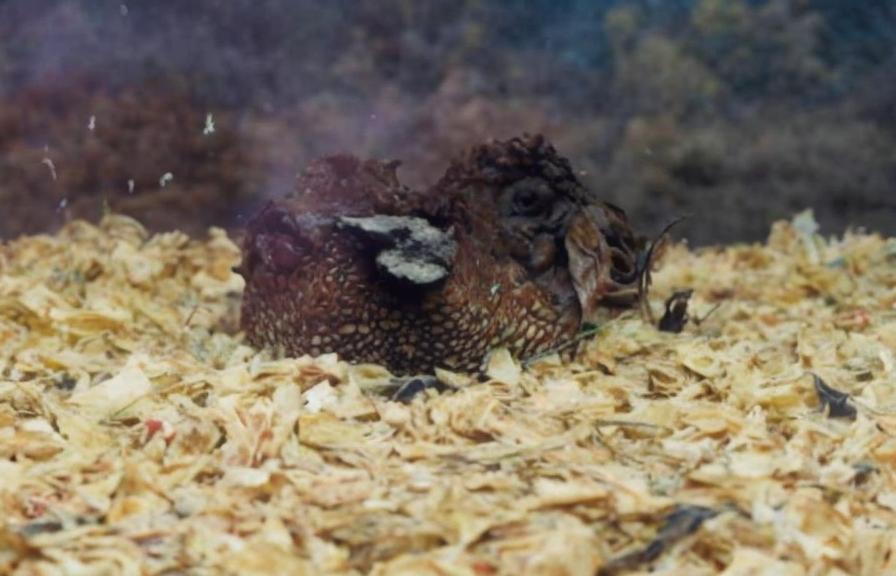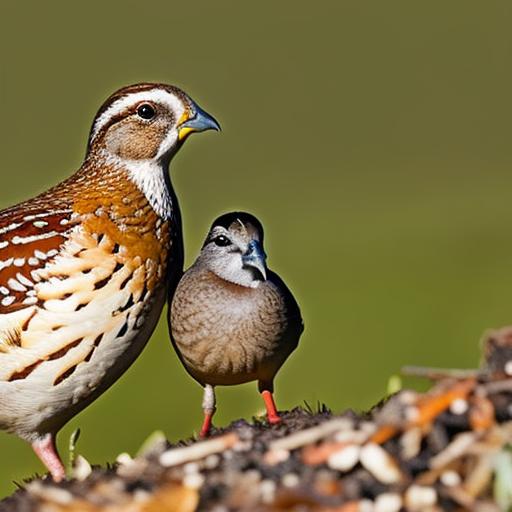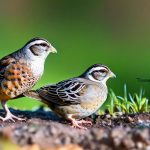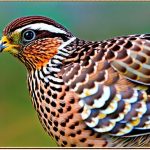When it comes to choosing the right quail species for your home, there are a few factors to consider. First, you’ll want to think about the size of the quail species. Some species, like the Coturnix quail, are larger and more robust, while others, like the Button quail, are smaller and more delicate. Consider the space you have available for your quail habitat and choose a species that will thrive in that environment.
Another important factor to consider is the temperament of the quail species. Some species are more social and can be kept in larger groups, while others are more solitary and may do better in smaller groups or pairs. Additionally, consider the noise level of the species. Some quail species are known for their loud calls, which may not be suitable for all living situations.
Finally, consider the purpose of keeping quail as pets. If you’re interested in raising quail for their eggs or meat, you’ll want to choose a species that is known for its productivity in these areas. On the other hand, if you’re simply looking for quail as pets, you may want to choose a species that is known for its friendly and docile nature.
In conclusion, when choosing the right quail species for your home, consider factors such as size, temperament, noise level, and purpose. By taking these factors into account, you can ensure that you choose a quail species that will thrive in your home environment and meet your specific needs and preferences.
Key Takeaways
- Choose the right quail species based on your needs and preferences, such as egg production, meat quality, or ornamental purposes.
- Set up a quail habitat with proper bedding, nesting boxes, and adequate space for exercise and foraging.
- Provide a balanced diet for quail, including commercial feed, fresh greens, and occasional treats like mealworms.
- Monitor quail health regularly and seek veterinary care if any signs of illness or injury are observed.
- Handle and tame your quail with patience and gentle interaction, avoiding sudden movements or loud noises that may startle them.
- Follow proper breeding and raising practices for quail chicks, including providing a warm brooder and monitoring their development.
- Avoid common mistakes such as overcrowding, improper diet, and inadequate predator protection when keeping quail as pets.
Setting Up the Quail Habitat
Setting up a suitable habitat for your quail is essential for their health and well-being. The first step is to choose an appropriate enclosure for your quail. This could be a large cage or aviary, depending on the number of quail you plan to keep. Ensure that the enclosure is secure and predator-proof, with a solid floor to prevent digging predators from gaining access.
Next, provide suitable bedding for your quail. This could be a layer of straw or wood shavings, which will help to absorb waste and provide a comfortable surface for your quail to walk on. Additionally, provide hiding spots and perches for your quail to roost on. This will help to reduce stress and provide enrichment for your birds.
It’s also important to consider the temperature and lighting in your quail habitat. Quail are sensitive to extreme temperatures, so it’s important to provide heating or cooling as needed. Additionally, ensure that your quail have access to natural light or provide artificial lighting to mimic natural daylight hours.
In conclusion, setting up a suitable habitat for your quail is essential for their health and well-being. By providing a secure enclosure, suitable bedding, hiding spots and perches, and appropriate temperature and lighting, you can ensure that your quail have a comfortable and enriching living environment.
Feeding and Nutrition for Quail
Feeding and nutrition are crucial aspects of caring for pet quail. A balanced diet is essential for their health and well-being. Quail are omnivorous birds and require a diet that includes a mix of seeds, grains, fruits, vegetables, and protein sources.
A commercial game bird feed can serve as the base of your quail’s diet. This feed is specially formulated to meet the nutritional needs of quail and can be supplemented with other foods. Additionally, provide your quail with access to grit, which helps them to grind their food in their gizzards.
In addition to commercial feed, offer your quail a variety of fresh fruits and vegetables as treats. This can include leafy greens, carrots, berries, and other nutritious options. Additionally, provide your quail with access to protein sources such as mealworms or crickets.
It’s important to monitor your quail’s food intake and adjust their diet as needed. Ensure that they have access to fresh water at all times and clean their feeding and watering dishes regularly.
In conclusion, feeding and nutrition are crucial aspects of caring for pet quail. By providing a balanced diet that includes commercial feed, fresh fruits and vegetables, and protein sources, you can ensure that your quail receive the nutrients they need to thrive.
Quail Health and Veterinary Care
Maintaining the health of your pet quail is essential for their well-being. Regular health checks are important to monitor for any signs of illness or injury. Look out for symptoms such as lethargy, loss of appetite, abnormal droppings, or changes in behavior.
It’s important to find a veterinarian who has experience with avian species, as not all veterinarians are knowledgeable about quail care. Regular check-ups can help to catch any health issues early on and ensure that your quail receive appropriate care.
Additionally, it’s important to maintain good hygiene in your quail habitat to prevent the spread of disease. Clean their enclosure regularly and provide fresh bedding to reduce the risk of bacterial or fungal infections.
In conclusion, maintaining the health of your pet quail is essential for their well-being. Regular health checks by a knowledgeable veterinarian and good hygiene practices can help to ensure that your quail remain healthy and happy.
Handling and Taming Your Quail
Handling and taming your pet quail can be a rewarding experience, but it’s important to approach it with patience and care. Quail are naturally skittish birds and may take time to become comfortable with human interaction.
Start by spending time near your quail’s enclosure without trying to handle them. This will help them become accustomed to your presence and reduce their fear of you. Once they seem comfortable with this, you can start offering them treats from your hand to build trust.
When it comes to handling your quail, it’s important to do so gently and calmly. Approach them slowly and avoid making sudden movements or loud noises that could startle them. Support their body securely when picking them up to prevent injury.
It’s important to remember that not all quail will enjoy being handled, and it’s important to respect their boundaries. Some quail may never become fully tame, and that’s okay. It’s important to prioritize their comfort and well-being above all else.
In conclusion, handling and taming your pet quail can be a rewarding experience with patience and care. By approaching them gently and respectfully, you can build trust with your quail and create a positive bond.
Breeding and Raising Quail Chicks

Breeding and raising quail chicks can be a rewarding experience for pet owners who are interested in expanding their flock. The first step is to ensure that you have a suitable breeding pair or group of quail. Provide them with a comfortable nesting area where they can lay their eggs.
Once the eggs are laid, it’s important to provide an appropriate incubation environment if you want to hatch them yourself. This could involve using an incubator or allowing the parent birds to incubate the eggs themselves.
Once the chicks hatch, it’s important to provide them with a warm and safe environment where they can grow and develop. This could involve using a brooder with a heat lamp to maintain the appropriate temperature for the chicks.
It’s important to monitor the health of the chicks closely and provide them with appropriate nutrition as they grow. Additionally, ensure that they have access to clean water at all times.
In conclusion, breeding and raising quail chicks can be a rewarding experience with proper preparation and care. By providing a suitable nesting area, incubation environment, and brooder setup, you can help ensure the health and well-being of the quail chicks as they grow.
Common Mistakes to Avoid when Keeping Quail as Pets
When keeping quail as pets, there are several common mistakes that pet owners should be aware of in order to provide the best care for their birds. One common mistake is overcrowding the quail habitat. It’s important to provide enough space for your quail to move around comfortably without feeling cramped.
Another common mistake is not providing enough hiding spots or perches in the habitat. Quail are naturally shy birds and need places where they can retreat if they feel stressed or threatened.
Additionally, some pet owners may make the mistake of not providing a balanced diet for their quail. It’s important to offer a variety of foods including commercial feed, fresh fruits and vegetables, and protein sources to ensure that your quail receive the nutrients they need.
Finally, some pet owners may make the mistake of not seeking veterinary care when needed. It’s important to find a veterinarian who has experience with avian species and seek regular check-ups for your pet quail.
In conclusion, there are several common mistakes that pet owners should be aware of when keeping quail as pets. By avoiding these mistakes and providing appropriate care for your quail, you can ensure that they live happy and healthy lives in your care.
If you’re considering keeping quail as pets, you may also be interested in learning about the best coop options for chickens. Poultry Wizard offers valuable insights into different coop designs and how to turn a shed into a suitable chicken coop. Check out their article on what kind of coop is best for chickens to ensure your feathered friends have a comfortable and secure living space.
FAQs
What are quail?
Quail are small ground-dwelling birds that are part of the pheasant family. They are known for their distinctive calls and are often kept as pets or for their eggs and meat.
Can quail be kept as pets?
Yes, quail can be kept as pets. They are relatively low-maintenance and can be a great addition to a backyard or small farm.
What do quail need in their habitat?
Quail need a secure and spacious enclosure with access to fresh water, shelter, and a balanced diet. They also require a clean and dry environment to thrive.
What do quail eat?
Quail are omnivores and eat a diet that consists of seeds, grains, insects, and small invertebrates. It’s important to provide them with a balanced commercial quail feed as well as access to fresh greens and protein sources.
How do you care for pet quail?
Caring for pet quail involves providing them with a suitable habitat, a balanced diet, and regular monitoring of their health and well-being. It’s important to keep their enclosure clean and secure, and to provide them with enrichment activities.
Are quail social animals?
Quail are social birds and thrive in small flocks. It’s important to keep them in groups of at least 3-4 birds to prevent loneliness and stress.
Do quail require any special veterinary care?
Quail generally do not require special veterinary care if they are kept in a clean and healthy environment. However, it’s important to monitor their health and seek veterinary attention if any issues arise.
Can quail be kept with other pets?
Quail can be kept with other pets, but it’s important to ensure that their enclosure is secure and that they are not at risk of being harmed by other animals. It’s also important to consider the compatibility of different species before housing them together.
Meet Walter, the feathered-friend fanatic of Florida! Nestled in the sunshine state, Walter struts through life with his feathered companions, clucking his way to happiness. With a coop that’s fancier than a five-star hotel, he’s the Don Juan of the chicken world. When he’s not teaching his hens to do the cha-cha, you’ll find him in a heated debate with his prized rooster, Sir Clucks-a-Lot. Walter’s poultry passion is no yolk; he’s the sunny-side-up guy you never knew you needed in your flock of friends!







